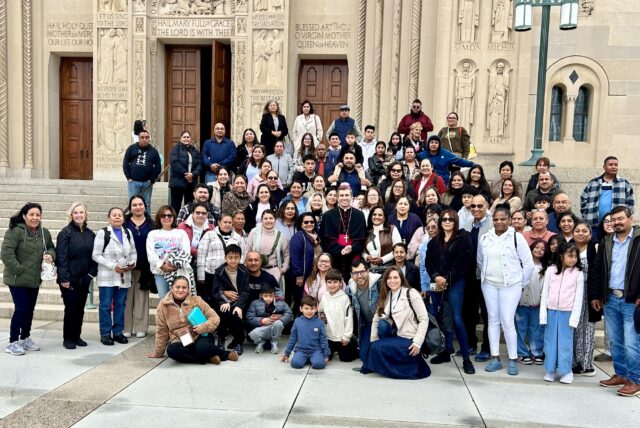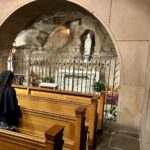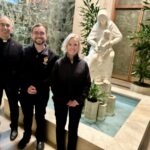
The story is told of an older woman who made an appointment with her parish priest to speak about the arrangements for her funeral. She was an active member of the parish, and the priest, knowing that most of her family had predeceased her, figured that she wanted to have something on file that indicated the readings and hymns that she would like used at her funeral Mass.
He was, therefore, surprised when she told him that she had instructed the funeral director to have a spoon placed near her casket. Intrigued as to a spoon’s significance, the priest listened ever more intently as the woman explained that she had attended numerous pot-luck dinners at the parish during her lifetime. And invariably, after the main meal had been eaten and the plates were being cleared away, she along with everyone else, was always told, “Hold on to your spoon, the best is yet to come.”
And so, she further explained, when people came to pay their final respects, she wanted them to know that as a disciple of Jesus, she viewed this and every moment of her life as preparation for the greater and more abundant life that God had in store for her. Through the death and resurrection of Jesus and his promise of eternal life, she knew that “the best is yet to come.”
In this Jubilee Year that Pope Francis has especially designated as the “Jubilee Year of Hope,” may we too be especially mindful that, as People of Hope “the best is yet to come.”
The Wedding Feast in Cana
We gather today in this magnificent Basilica dedicated to Mary, the Immaculate Conception, and we look to the Blessed Mother as the icon of the virtue of Hope.

We have just listened to the well-known Gospel story of the wedding feast in Cana at which the wine runs out. While it is a detail of what took place at a long-ago wedding, it is symbolic of life.
For as we know, one of the things that we undoubtedly experience is how plans and dreams at times go awry: how the wine runs out. You start a new job, a new relationship, a new dream — and everything sparkles. The music is playing, the laughter is easy, and the sun is shining. And then things happen. The career that I aspired to is no longer fulfilling.
Increasing pressures of life are taking their toll on one’s marriage. Classmates in school are excelling with seemingly minimal effort and I am barely passing. A loved one becomes ill. The excitement fades. The energy dries up. The joy that seemed effortless becomes hard to hold onto. And like the celebration of a wedding in Cana, things seem to be collapsing.
Going to Jesus
And so, what about that wedding feast.
A wedding feast in Jewish culture was the high point of community life. Running out of wine wasn’t just an inconvenience; it was shameful. It meant failure. So when Mary notices the problem, she does what any good mother does — she brings it straight to her Son. “They have no wine.” Now, on the surface, it’s a small thing. But it’s deeply symbolic. In Scripture, wine represents joy, abundance, celebration — the fullness of life that God wants for His people. And that’s where the story hits home. Mary shows us what divine hope looks like in that moment. It’s not denial. It’s not pretending everything’s fine. It’s turning to Jesus and saying, “I can’t fix this. But You can.”
‘Do whatever He tells you’
Jesus’ response seems strange: “Woman, my hour has not yet come.” It sounds like He’s saying “no.” But Mary doesn’t argue. She doesn’t panic. She simply turns to the servants and says, “Do whatever He tells you.”
Remarkable isn’t it? She doesn’t know what Jesus will do. She just knows who He is. That’s hope — divine hope — not confidence in outcomes, but confidence in God’s character.
During this Jubilee Year of Hope, as we look to Mary as the Mother of Divine Hope, we look to Mary because, if you are at all like me, I want clarity. I want to be able to go to be assured of the what, how and when of everything working out. And Mary gives us something better — trust. Trusting in Christ’s promises is exactly the way that the Catechism of the Catholic Church defines the virtue of “Hope.” Mary teaches us that true faith doesn’t demand explanations. She doesn’t try to control the miracle. She simply leaves room for it.
The Miracle of Transformation
Then comes the moment. Jesus tells the servants to fill the jars — six large stone jars used for Jewish purification — with water. Ordinary water. And that’s what he transforms.
Notice what happens: Jesus takes something used for ritual cleansing — a symbol of the old covenant — and fills it with new wine, a symbol of the new covenant. He’s not just saving a wedding party. He’s announcing that through Him, the old is passing away, and the new has come. In other words, Jesus doesn’t just refill what’s empty; he transforms it.
That’s divine hope. Not a return to how things used to be, but a transformation into something new and better. And it all starts with Mary’s simple act of trust. “Do whatever He tells you.”
The First Sign-The Final Sign
John ends the story by saying, “This, the first of His signs, Jesus did at Cana in Galilee as manifested His glory.”
It was the first sign — and yet, it points to the final sign: the cross. Because Jesus’ “hour” — the one He mentioned to Mary — would come not at a wedding, but at Calvary. There, too, His mother would stand and watch. There, too, her hope would be tested. And Mary’s hope is vindicated — not by avoiding the cross, but by standing and trusting through it, all the way to the Resurrection. That is why she’s the Mother of Divine Hope. Because she believes — even in the darkness — that God’s story is not finished.
The Best Wine is Last
When your own “wine” runs out — when life feels dry, when faith feels small — Mary’s words echo across the centuries. “Do whatever He tells you.” May we bring to Jesus our grief, fear, fatigue, doubt. He’s still in the business of turning water into wine — of taking what’s ordinary and filling it with divine grace. Because just when you think the story’s over, God is preparing the best wine for last. As the head waiter remarks, “Everyone serves good wine first, and then when people have drunk freely, an inferior one; but you have kept the good wine until now.” Or, in the words of that older woman whose story began this homily, “The best is yet to come.”
Mary, Mother of Divine Hope … pray for us.
Bishop William E. Koenig is the tenth bishop of the Catholic Diocese of Wilmington.




























